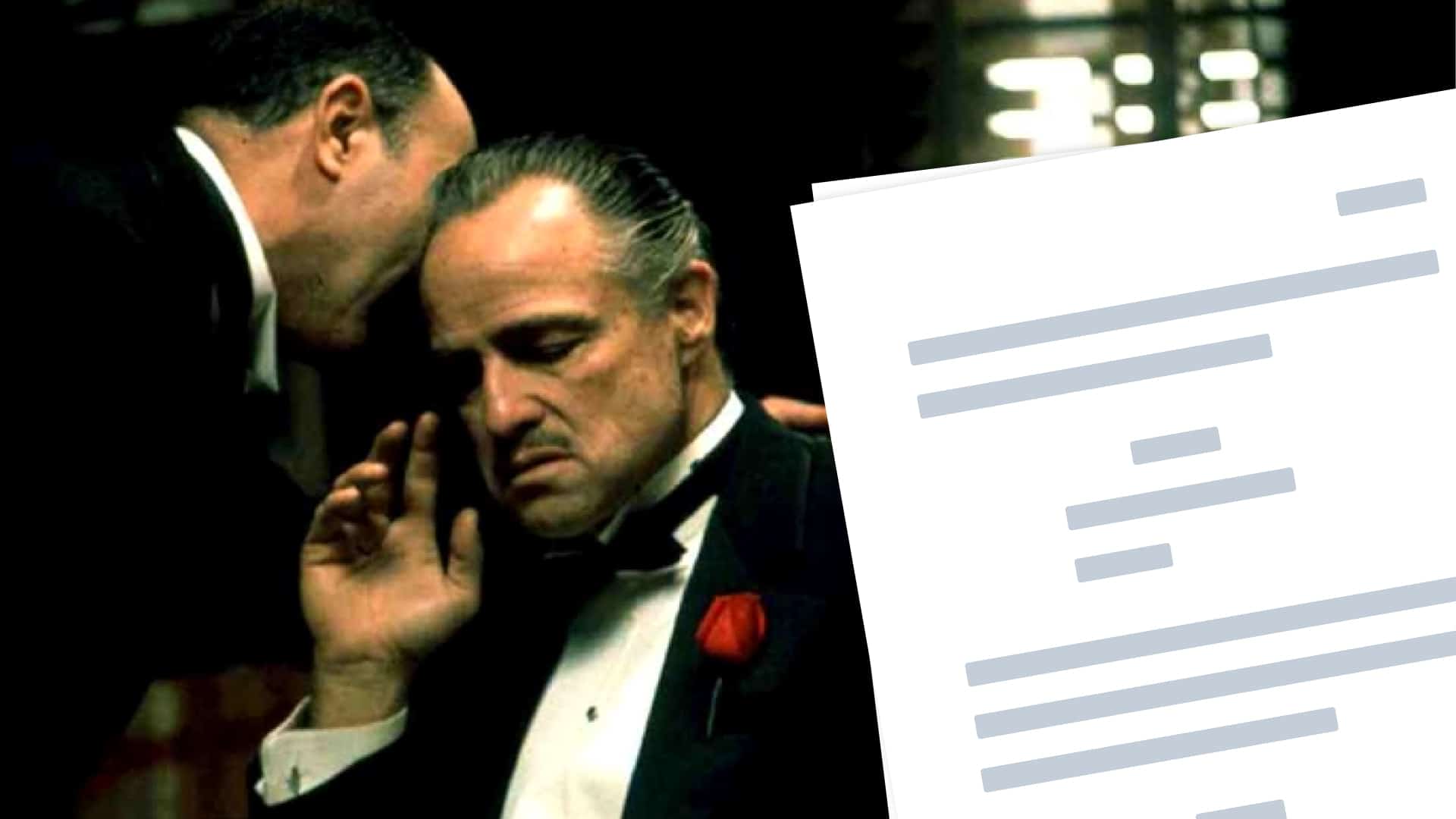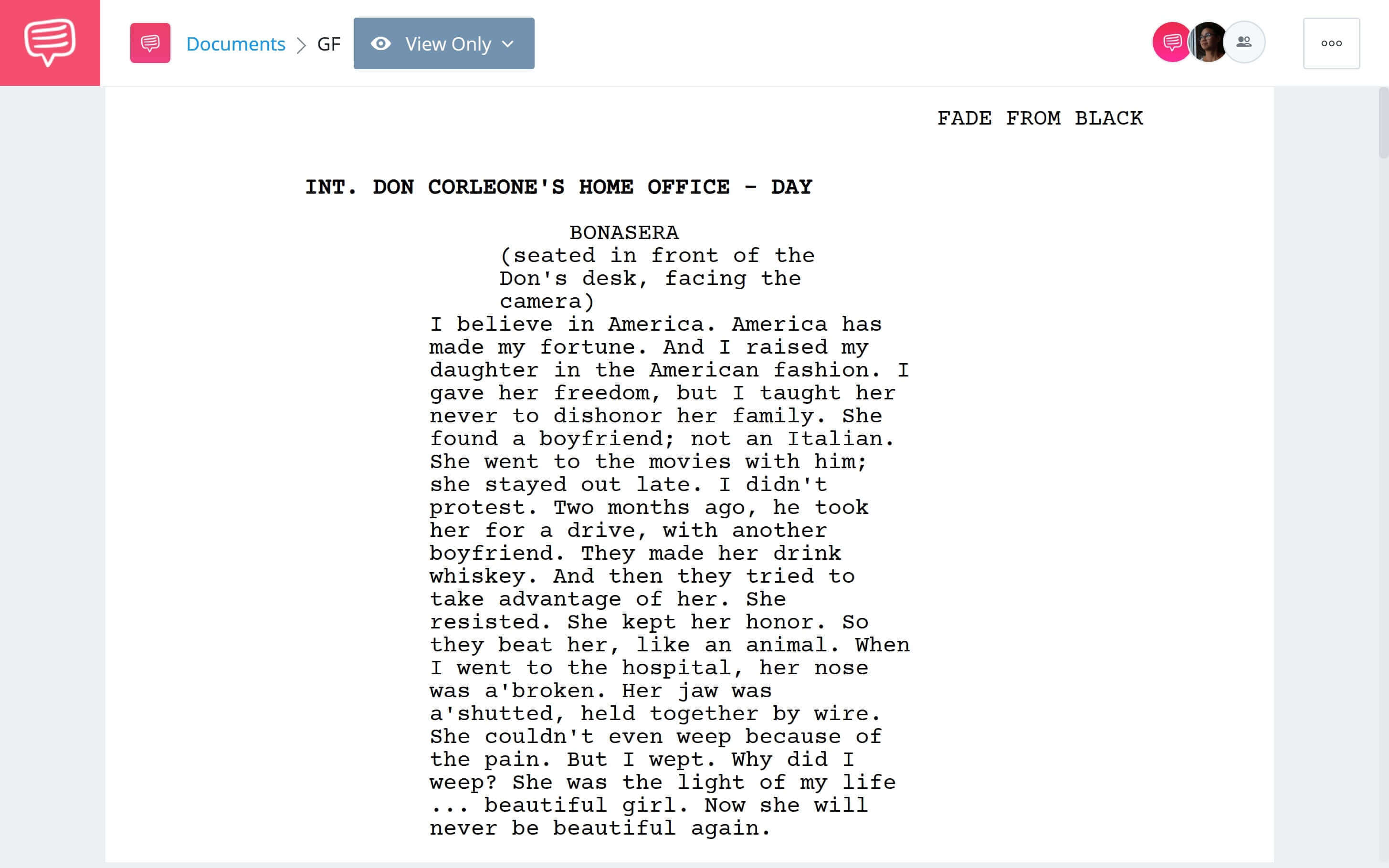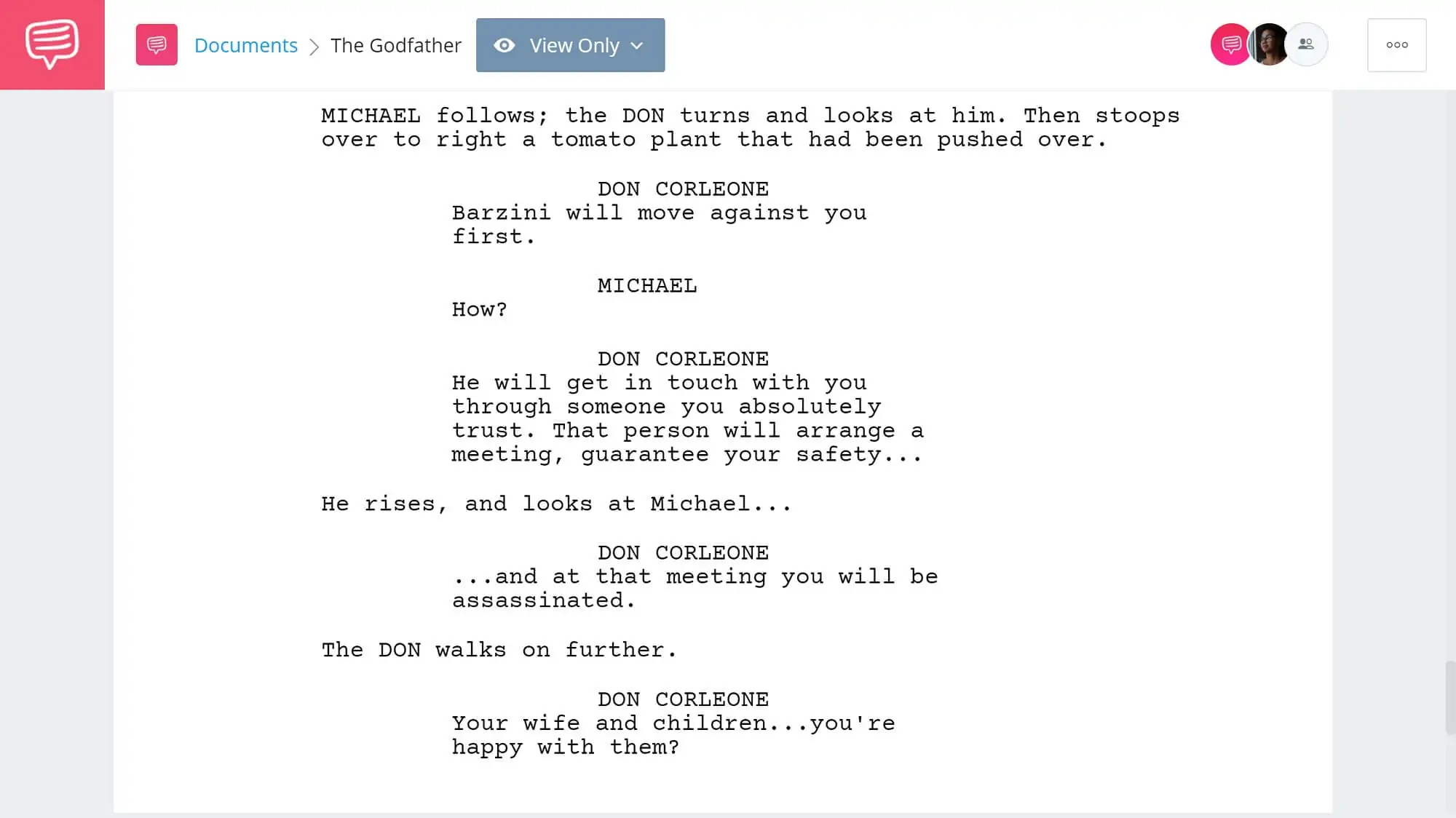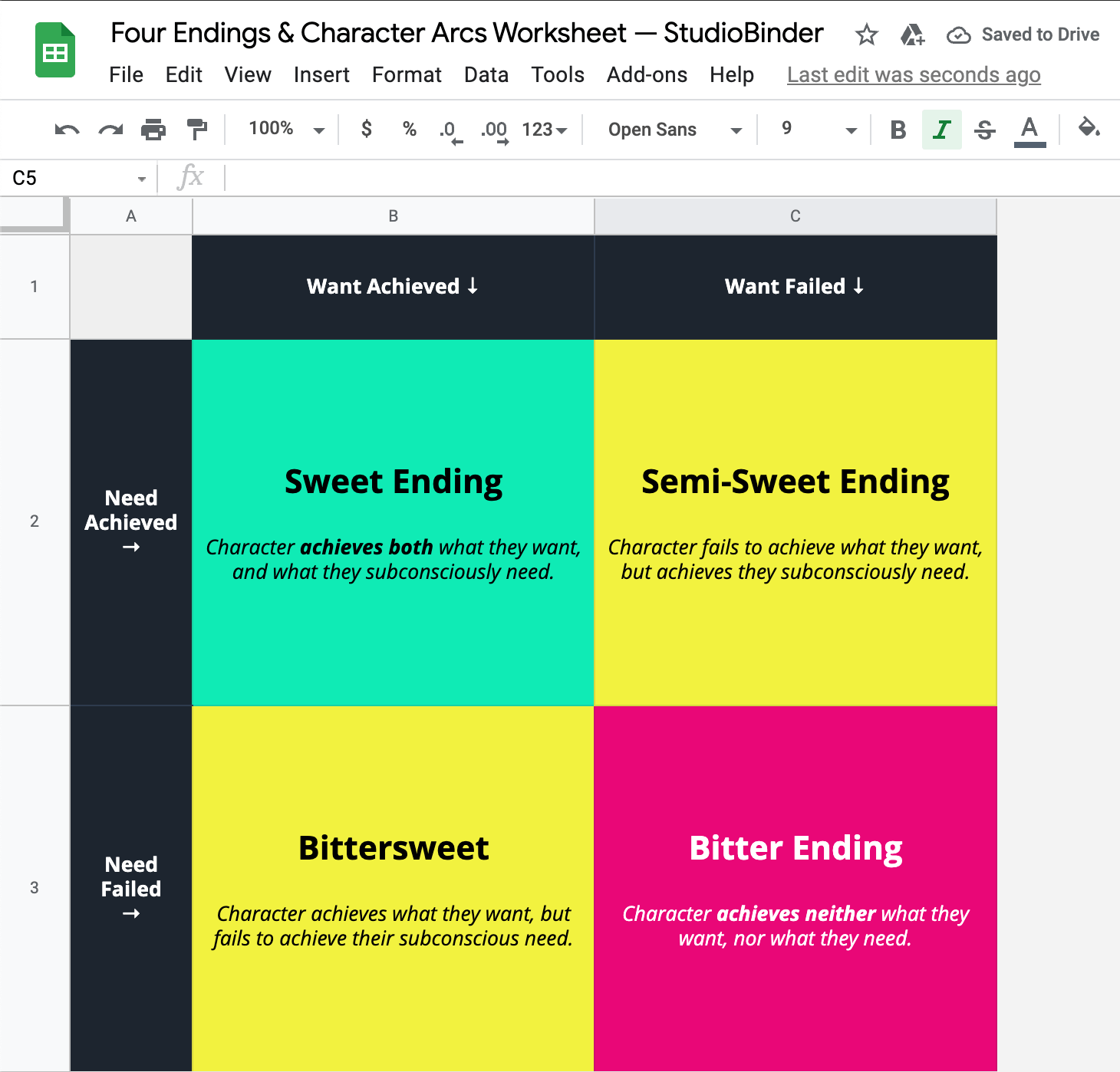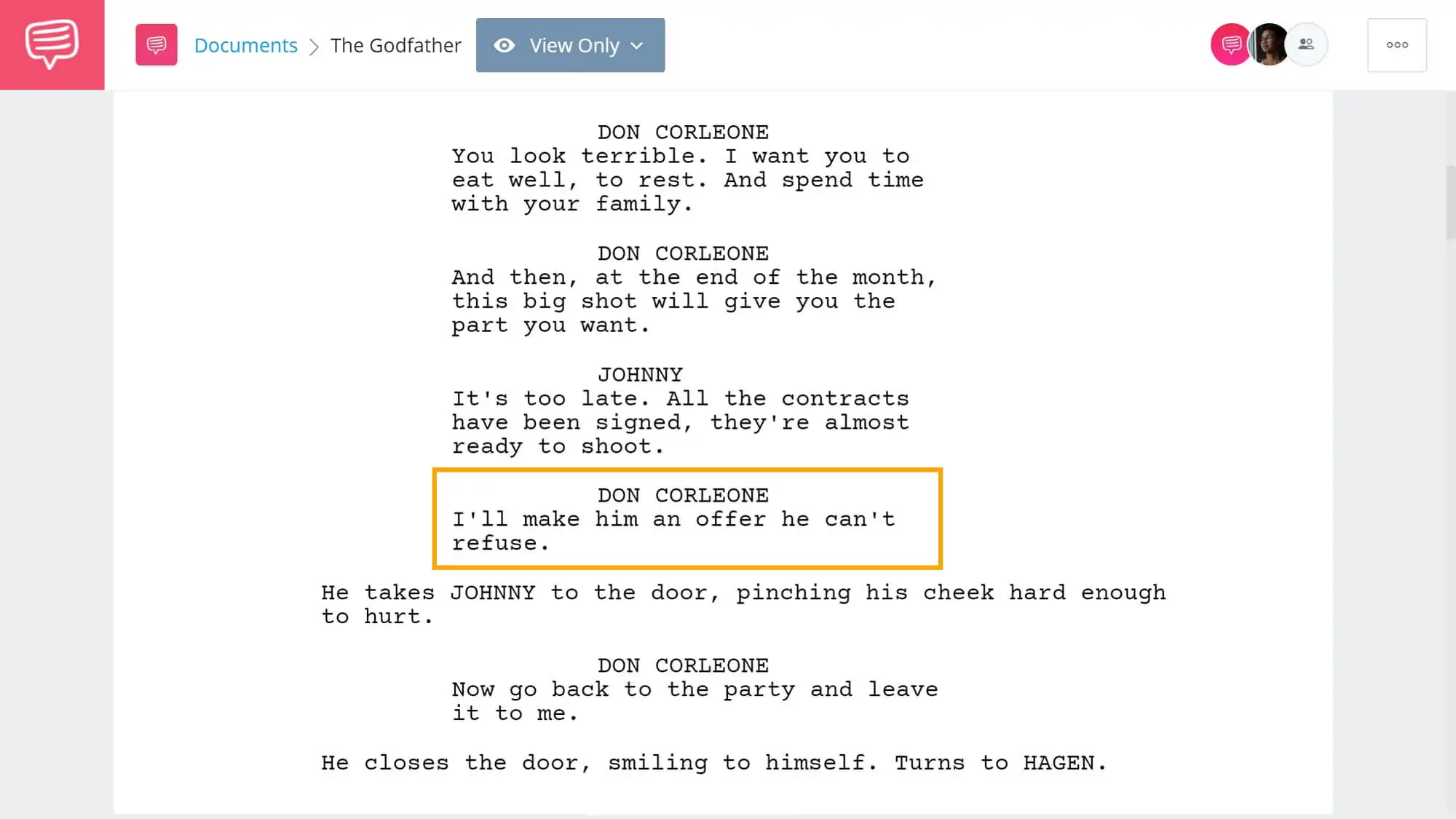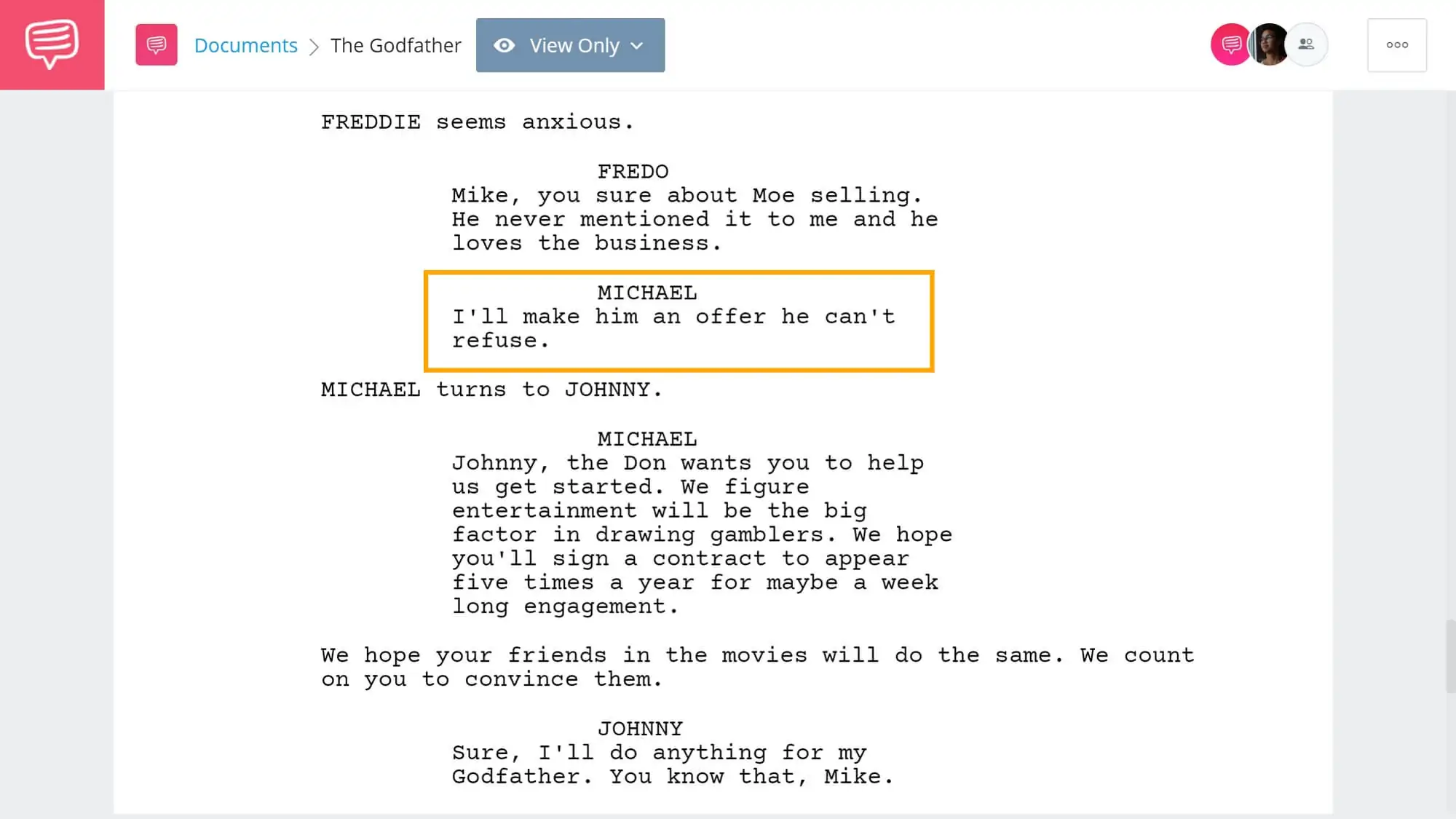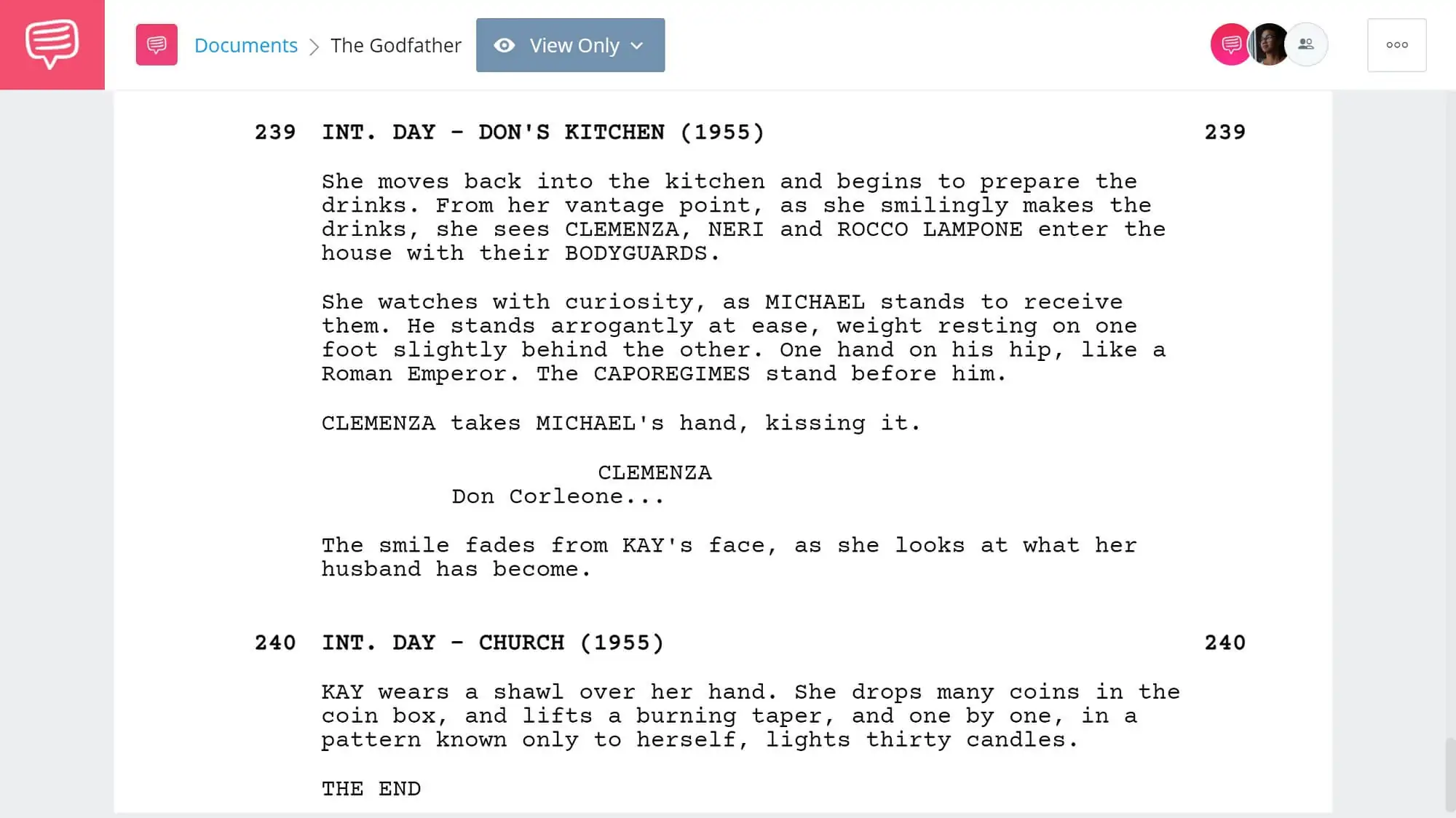The Godfather is nothing short of a masterpiece. That’s because every single facet of the film’s production is layered with detail, emotion, and purpose. But everything that we see visually in the final cut was once just an idea in the minds of Mario Puzo and Francis Ford Coppola, initially transcribed onto the page as The Godfather script.
Get your FREE Character Arcs & Endings Worksheet
Enter your email so we can send you the free writing worksheet (made in Google Drive).
WHO WROTE THE GODFATHER SCRIPT?
Written by Mario Puzo and Francis Ford Coppola
Mario Puzo was an American novelist, author, and screenwriter who was born and raised in Hell’s Kitchen, New York. Throughout his career, Puzo wrote dozens of scripts, books, and short stories; many of which involved the Mafia: including The Godfather and The Sicilian.
Francis Ford Coppola is an American filmmaker who was one of the forefront faces of the Hollywood New Wave. Ford Coppola began his career in Hollywood as a screenwriter before rising to prominence in 1972 with The Godfather.
Other notable Coppola scripts: The Godfather: Part II, The Conversation, and Apocalypse Now.
THE GODFATHER SYNOPSIS
STRUCTURE OF THE GODFATHER SCREENPLAY
Here is the story structure for The Godfather screenplay:
Exposition
Vito Corleone, the “Don” and “Godfather” is hosting a wedding reception for his daughter Connie. As is Sicilian tradition, Vito takes meetings with the wedding’s guests. His four sons: Sonny, Fredo, Tom, and Michael intermingle with the wedding guests as well.
Inciting Incident
The Corleone men go to pay respects to Don Vito’s consigliere, “right-hand man” Genco, who is lying on his deathbed. Genco dies and Don Vito’s adopted son Tom inherits the job.
Plot Point One
Tom is sent to California to deal with Hollywood producer Jack Woltz, who is interfering with the family’s business. Although initially rejected, Tom is able to control Woltz by placing the severed head of his prized horse in his bed.
Plot Point Two
Don Vito is offered a business proposition from a rival associate named Sollozzo that would allow the Corleone family to enter the drug trade. Vito’s eldest son Sonny encourages him to accept the deal, but he rejects.
Rising Action
Don Vito is set up by his bodyguard and shot by Sollozzo’s men. Sonny commandeers control of the family’s business operations. Sollozzo approaches Tom with a truce, but only if he’s able to convince Sonny to accept the initial business deal.
Rising Action Two
Michael becomes increasingly involved in the family business while Sonny becomes more and more of a loose-cannon. Sollozzo asks for a meeting with Michael, which he accepts.
Midpoint
Michael assassinates Sollozzo and his police-contact during the meeting, then flees the country.
Rising Action One
Sonny nearly beats Connie’s husband Carlo to death after learning that he’s been abusing her.
Rising Action Two
Don Vito is released from the hospital. Shortly after, Sonny is murdered. Don Vito then organizes a meeting between “the five families” of the Mafia to offer an end to the bloodshed. The families agree to stop the war.
Build Up
Michael marries a young woman named Appolonia while hiding out in Italy. The two plan to hide out until it’s safe to return to America, but she’s killed by Michael’s supposed bodyguard Fabrizio before they can.
Climax
Years later, Don Vito dies while tending to his garden. Michael marries Kay and re-engages a war on the five families of New York.
Finale
Michael is ordained as the Godfather of Connie and Carlo’s son. Just after the ceremony, Michael reveals that he knew Carlo was involved in Sonny’s death and has him executed. Michael also has the heads of the five families murdered.
Denouement
Connie approaches Michael in hysterics, alleging that he killed Carlo; a notion that he strongly denies. Kay then confronts Michael and demands that he tell her whether or not he had a role in Carlo’s death. Michael lies and tells her he did not.
The Godfather Script Takeaway #1
Characters in The Godfather
How does The Godfather masterfully pull off the transfer of power from one character to another? In the beginning, Michael couldn't be further away from his father and the family business. Don Vito hopes that his youngest son would one day assume the throne but Michael wants nothing of it.
Later, after Don Vito is gunned down, it is Michael that steps up and takes his first steps towards becoming the Godfather. This process truly begins in this scene, as power is contested between Tom and Sonny, but it is Michael who ends up wearing the crown.
In this video, watch how Coppola uses simple character blocking and staging to communicate this power dynamic visually. Its scenes like this that make The Godfather one of the best gangster movies ever made.
The Godfather • How to Direct Power • Subscribe on YouTube
At its core, The Godfather is a film about the transfer of power and the effect it has on all parties involved.
This next scene takes place after Michael returns to New York from Sicily, after he’s killed Sollozzo, and after he’s lost a wife to violence. This sobering interaction between Vito and Michael is bursting with emotion and thematic weight. It plays on the philosophical question of destiny, and the sociological quandaries of corruption in power.
The Godfather Characters • Plot Building • Read Full Scene
The questions at the scene’s core ask: Was it ever possible that Michael could be a doctor, a lawyer, or a senator? Was he always destined to be the next Godfather? And what does it mean to be the Godfather?
The scene doesn’t give us all the answers to these questions though; instead, it just leaves us with a unifying message from Vito, “You are like me, we refuse to be fools, to be puppets dancing on a string pulled by other men.”
The Godfather script was submitted to Paramount 40 pages over the agreed-upon max. As such, the script had to be re-worked every day on set. In the film version of this scene, much of the dialogue is different than it was on the page.
However, the same intent and nuance is expertly communicated by actors Al Pacino and Marlon Brando. At the time of The Godfather’s production, Pacino was still an up-and-comer, but the world was already well aware of Brando. Despite his limited screen time, The Godfather is still one of Marlon Brando’s best films.
According to cultural historian and author Harlan Lebo, detailed in his book The Godfather Legacy, screenwriter Robert Towne (Chinatown, Mission: Impossible) worked on this scene with Puzo and Ford Coppola.
If you're looking to map out a character arc like Michael Corleone, download our FREE Character Arc worksheet below.
Free downloadable bonus
FREE Download
Character Arc + 4 Endings Worksheet
Download this interactive worksheet to help guide both your character's arc and the type of ending you're aiming for. By laying out the Wants and Needs of your character in advance, you'll be able to construct a character arc and ending that are perfectly matched and ultimately satisfying.
The Godfather Script Takeaway #2
Power in The Godfather quotes
What makes a quote a quote, and not just another line of dialogue? Most of the time, an iconic quote expresses a key theme of a story and is delivered at an important time.
Take the line “I’ll make him an offer he can’t refuse” for example. This is what Don Vito says to Johnny, ensuring him that he’ll be offered a movie part that is assumed to be unattainable. Read the scene first and you'll see that the power behind that line doesn't come across on the page.
The Godfather Quotes • An Offer He Can’t Refuse • Read Full Scene
As written, this iconic Godfather quote could have been delivered in any number of ways. In the hands of lesser actor, they might have taken that line and squeezed every bit of menace and threat into it.
But let's watch Brando's take on it. Notice that it is the ease and casualness that gives the line so much power. He is talking about threatening to kill a man as if it were nothing.
The Godfather • The Offer Scene
This quote adds to the mysticism of Don Vito and the role of “the Godfather.” It also establishes that he has considerable power, far beyond what’s expected through traditional means.
Now let’s fast forward to later in the story, to a point where Michael has inherited the powers of the Godfather. The return of the "an offer he can't refuse" line now connects father and son.
The Godfather Quotes • Michael's "An Offer He Can’t Refuse” • Read Full Scene
Now watch the final scene in the film. Michael delivers the line just as casually as his father did, aligning them and their temperaments perfectly. You can imagine how differently hothead Sonny would've read the line — it's that same outward anger that got him killed.
The Godfather • Michael Makes an Offer
This quote serves to connect Don Vito and Michael, and unite them under the banner of “the Godfather.”
Here are some other great quotes from The Godfather script:
“You don't think to call me Godfather; instead you come to my house on the day my daughter is to be married and you ask me to do murder...for money.”
“You are looking at six hundred thousand dollars on four hoofs.”
“Would you like me better if I were Ingrid Bergman?”
“A Sicilian message: Luca Brasi sleeps with the fishes.”
“Sonny, it's all personal, and I learned it from him, the old man, the Godfather.”
“Forget about Mikey; he's no good for you, anymore.”
“Consigliere, arrange a meeting with the heads of the five families...this war stops now.”
“Governments only protect men who have their own individual power."
The Godfather Script Takeaway #3
Creating a perfect ending
We’ve looked at instances of nuance within The Godfather script, but oftentimes, the most important aspect of a script is how it begins and how it ends.
In this regard, The Godfather plot is rock-solid, with a story-arc that’s rooted in a clear and purposeful direction. Over the course of 130 pages, we see how an intelligent, young war-hero becomes the Capo “head” of the most ruthless crime family in the world.
The finale in which Michael has Carlo killed and the subsequent denouement show us Michael’s ascent in power and descent in morality. If you know how denouement works, you know The Godfather has a bittersweet ending.
The Godfather Ending • Michael’s Ascent • Read Full Scene
When Connie confronts Michael, demanding to know whether or not he killed Carlo, he’s incredibly dismissive. When Kay asks Michael to tell the truth, to admit if he killed Carlo, he says that he didn’t.
Some have argued that Michael isn’t lying because he didn’t personally kill Carlo, but that’s kind of beside the point.
The Godfather • Ending
In this moment, Michael abandons his past self and quite literally closes the door on his old life; all while the tragic orchestral score from Nino Rota plays out the crowning of the new Godfather. As it turns out, Rota was responsible for several scores for the best mafia movies ever made.
Get your FREE Character Arcs & Endings Worksheet
Enter your email so we can send you the free writing worksheet (made in Google Drive).
UP NEXT
Read and Download More Scripts
The Godfather is a groundbreaking and brilliantly made film that deals with themes of power, corruption and family with subtly and finesse. If you want to read more, we have other great titles, such as Goodfellas, The Irishman and Uncut Gems in our screenplay database. Browse and download PDFs for all of our scripts as you read, write and practice your craft to become the next great screenwriter.
